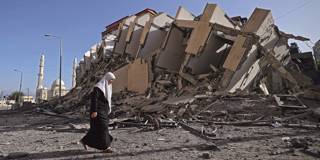Major political and diplomatic developments in the Middle East have upended much of the conventional wisdom about – and within – the region. But if one old truth still holds, it is that too many Arab leaders refuse to accept the need for fundamental governance reforms.
AMMAN – The year 2021 brought major developments across the Middle East and North Africa, the effects of which will extend far into the future. The US withdrawal from Afghanistan was only the latest sign that the region is not only changing fast but also falling down the international community’s list of priorities.
Already, the region looks very different than the one the world has known in recent decades, owing to recent developments in the Arab-Israeli conflict (especially the signing of the Abraham Accords), Lebanon’s implosion, and the crisis in Tunisia, among other issues. Much conventional wisdom about the region – and within it – no longer holds true.
The United States’ disastrous invasion and occupation of Iraq in 2003 had long since left the American public wary of military interventions and nation building, and the withdrawal from Afghanistan was the final manifestation of this disenchantment. American voters and subsequent US administrations have concluded that their country is not particularly adept at promoting democracy or building institutions outside its borders. And since America’s shale boom effectively eliminated its dependence on oil from the Middle East, the US has taken a diminishing interest in countries that seem unwilling or unable to establish more productive, inclusive political and economic systems.

AMMAN – The year 2021 brought major developments across the Middle East and North Africa, the effects of which will extend far into the future. The US withdrawal from Afghanistan was only the latest sign that the region is not only changing fast but also falling down the international community’s list of priorities.
Already, the region looks very different than the one the world has known in recent decades, owing to recent developments in the Arab-Israeli conflict (especially the signing of the Abraham Accords), Lebanon’s implosion, and the crisis in Tunisia, among other issues. Much conventional wisdom about the region – and within it – no longer holds true.
The United States’ disastrous invasion and occupation of Iraq in 2003 had long since left the American public wary of military interventions and nation building, and the withdrawal from Afghanistan was the final manifestation of this disenchantment. American voters and subsequent US administrations have concluded that their country is not particularly adept at promoting democracy or building institutions outside its borders. And since America’s shale boom effectively eliminated its dependence on oil from the Middle East, the US has taken a diminishing interest in countries that seem unwilling or unable to establish more productive, inclusive political and economic systems.